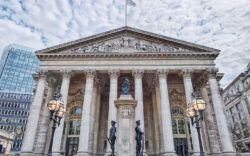- Free-money-inflated political promises
- Inflation and higher interest rates have popped big government
- Elections in 2024 will be fought over what’s affordable
2022 will be remembered as the year when inflation popped the bond market bubble.
2023 will be remembered as the year when higher interest rates popped the free-money-reliant green energy bubble.
What will 2024 be remembered for?
Back in August, I pointed out that higher interest rates and inflation will eventually cause a radical shift in political priorities. In short, governments can’t afford to buy elections anymore. Not even with other people’s money.
The UK government has already had a bond crash topple a government. The US government’s interest expense is running at a $1 trillion pace, while governments across Europe are looking in even worse shape.
With a series of elections set for this year, I suspect dramatic change may be in the air for the bubble in political promises…
***
What happens to politics when the debt finally matters?
[This article was first published on 16 August 2023.]
- Interest on government debt is set to have a political impact
- How will politicians cope with constraints on their spending?
- Let me know your thoughts on what happens next
Fair warning: today’s Fortune & Freedom will be unusually useless. It has lots of questions for you, instead of answers. That’s because I’ve been wondering about what the political world will look like when the interest expense on the government’s debt becomes a major budget item that actually constrains government spending.
How will our political world change when politicians don’t get money for nothing and interest for free?
For decades now, UK politicians haven’t had to worry about the deficit or interest. They could propose as much spending as they liked without having to worry about the consequences.
Debt was high, but interest rates were kept so low that even that didn’t matter.
Of course, some politicians liked to make the debt and deficit into an issue. But it was for political show. Or to prevent us from getting into the muddle we find ourselves in today, if you believed them. Either way, they only ever slowed us down on our way to the destination.
But now, with debt surpassing GDP and interest rates above 4%, there’s a little item on the national budget about as big as the education budget and double the defence budget. They call it “interest”, perhaps because it’s about to make things interesting.
The debt ratings agency Fitch expects HMRC to spend £110 billion on debt interest in 2023, which is about 10% of government revenue.
With deficits likely to continue, this means that ever more tax revenue is set to go to paying interest on the debt, leaving ever less for other purposes.
Given how much political debate there is over the defence and education budgets, you might think that interest gets a lot of airtime too… but it doesn’t.
I’m arguing it will soon. And that will radically change UK politics.
Suddenly, the debt and deficit are not some future prime minister’s problems that politicians can choose to ignore. It now has very real and direct impacts on the government of the day.
Every extra pound spent on something is suddenly going to remove more than a pound from the budget, because the government is going to have to borrow that money at around 4.3%. You might say that spending will cost more than is spent.
If you want to spend more on education, that’s fine. However, that’s going to put a disproportionate amount of pressure on something else as more money is redirected to paying interest. Either taxes will have to rise even more than you want to spend, or some other spending will have to be cut disproportionately.
This pressure won’t just impact spending plans, it can even pull the rug out from under a government completely, as Liz Truss discovered. If the interest bill spikes as a share of government expenses, the rest of the budget is at risk.
I’m expecting the same phenomenon to play out, but more slowly and as a more subtle force.
Attempting to solve the problem now requires a disproportionate sacrifice. We must bear the burden of interest as we attempt to pay down debt. It’s hard to do, even for people not trying to get elected.
My real question is: how does this change the incentives of politics? What sort of politician and government will get elected in the future? What sort of policies would they announce?
You see, making spending promises simply won’t work if the overall impact on the budget becomes destructive in the short run, not just the long run. The consequences of too much spending will impact the same government that makes the announcement instead of some future sucker who gets handed the old maid of too much debt and interest.
That old maid now sits in the cabinet as minister for the interest expense — a major part of the cabinet, given that interest is prioritised over all other forms of spending and soaks up a bigger portion of that spending than most other portfolios.
Who would want to serve in a cabinet alongside such an elephant in the room, leaving little space for anything else on the budget?
Politicians who make tough choices between things… well… do they even exist these days?
Will future politicians go for broke like the Greeks did, hoping some adult in the room comes to rescue them from their own ways?
Will the “A” word (austerity) make a comeback?
Look, I don’t know the answer. Let me know what you think by emailing nickolai@fortuneandfreedom.com, with your permission to publish your comments under your initials.
But here’s my best guess: inflation offers politicians a way out of this morass.
It allows politicians to inflate away the burden of their past debts.
But this only works with the cooperation of the central bank, which must engineer the inflation in the first place as well as keep interest rates low.
If they let interest rates go up, your interest expense bill will only grow.
But if the central bank can successfully engineer high inflation and low interest rates, then the government budget can come under control again.
How?
Just as your pound in 2019 is worth less than 80p today, the value of the government’s debt will be inflated away.
And just as a mortgage borrower who fixed their mortgage in 2021 sat pretty in 2022, the government’s interest bill will be inflated away at low interest rates.
Gosh, it’s as if the government and Bank of England just recently pursued this policy, isn’t it!?
Deliberately…
Until next time,

Nick Hubble
Editor, Fortune & Freedom


